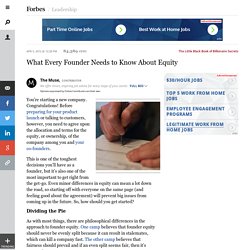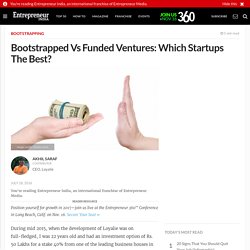

Debt Financing Pros and Cons - Small Business Blog. What Every Founder Needs to Know About Equity. You’re starting a new company.

Congratulations! Before preparing for your product launch or talking to customers, however, you need to agree upon the allocation and terms for the equity, or ownership, of the company among you and your co-founders. This is one of the toughest decisions you’ll have as a founder, but it’s also one of the most important to get right from the get-go. Even minor differences in equity can mean a lot down the road, so starting off with everyone on the same page (and feeling good about the agreement) will prevent big issues from coming up in the future. So, how should you get started? Dividing the Pie As with most things, there are philosophical differences in the approach to founder equity. While there’s no formula or one-size-fits-all approach, there are a number of factors that are generally taken into consideration: Whose idea was it?
Vesting Dilution When founders launch a start-up, they own the entire thing. Everything You Need to Know About Equity Crowdfunding. Starting today, companies using crowdfunding websites to raise money can offer stock options to donors.

More than four years after equity crowdfunding was signed into law through the 2012 JOBS Act, the Securities and Exchange Commission is permitting start-ups to offer stock in their companies to the investing public through consumer-facing websites. As of 6 a.m. ET today, companies that first file forms with the SEC are permitted to raise funds through sites like WeFunder. Previously, securities laws only permitted "accredited investors," or those who earn at least $200,000 in income (or $300,000 with a spouse) or those who have more than $1 million in their net worth without their primary residence, to invest in early-stage start-ups.
But, the SEC warns the public that there are risks to investing -- that's one of the reasons the law took four years to be implemented. Subsequently, the SEC is limiting how much people can invest through crowdfunding. Bootstrapped Vs Funded Ventures: Which Startups The Best? You're reading Entrepreneur India, an international franchise of Entrepreneur Media.

Reader Resource Position yourself for growth in 2017—join us live at the Entrepreneur 360™ Conference in Long Beach, Calif. on Nov. 16. Secure Your Seat » During mid 2015, when the development of Loyalie was on full-fledged, I was 22 years old and had an investment option of Rs. 50 Lakhs for a stake 40% from one of the leading business houses in Kolkata.
A year from that date today, I’m sitting on multiple offers, valuing the company at millions of dollars. Now you might be wondering, why would I be doing that? However, every entrepreneur should know that equity is the most expensive form of capital (A simple Google search will delve into the details of the same). My startup isn’t a typical startup. Bootstrapping allows a lot more freedom in decision-making and more scope to follow my instincts with advice from just a small core team. Entrepreneur 360 Conference | Nov. 16. 12 pros and cons of raising money vs. bootstrapping. For startup founders, it's an age-old question: is it better to bootstrap or to raise funding?

It certainly depends on your goals and your industry to some extent. But if you're new to the startup world, what variables should you look at to determine which is better for your company in the long run? To find out, I asked 12 entrepreneurs from Young Entrepreneur Council (YEC) when it's necessary to involve outside investors. Their answers are below. 1.
While the answer depends on the type of business and business model, it's often critical to raise money instead of bootstrapping if you really need to accelerate growth or invest in product development. Doreen Bloch, Poshly Inc. 2. That being said, some of our happiest clients never took on third party financing. Doug Bend, Bend Law Group, PC 3. If you're in a space where the first to market will have a massive moat that will be hard to compete against, raising funds will be necessary for success. Brennan White, Cortex 4. 5. 6. 7. 8.